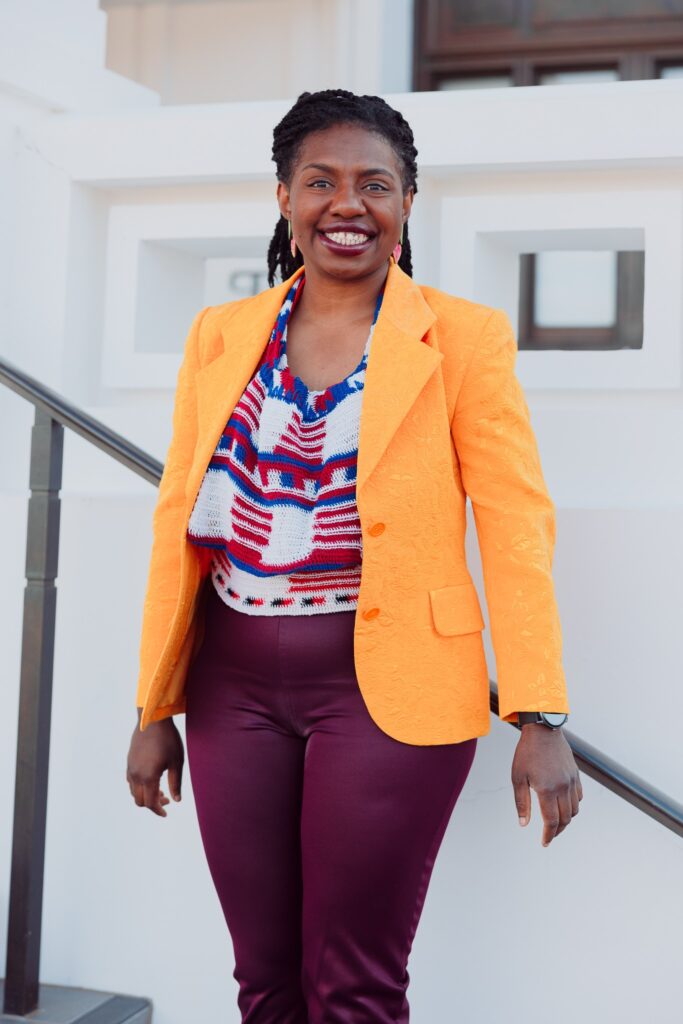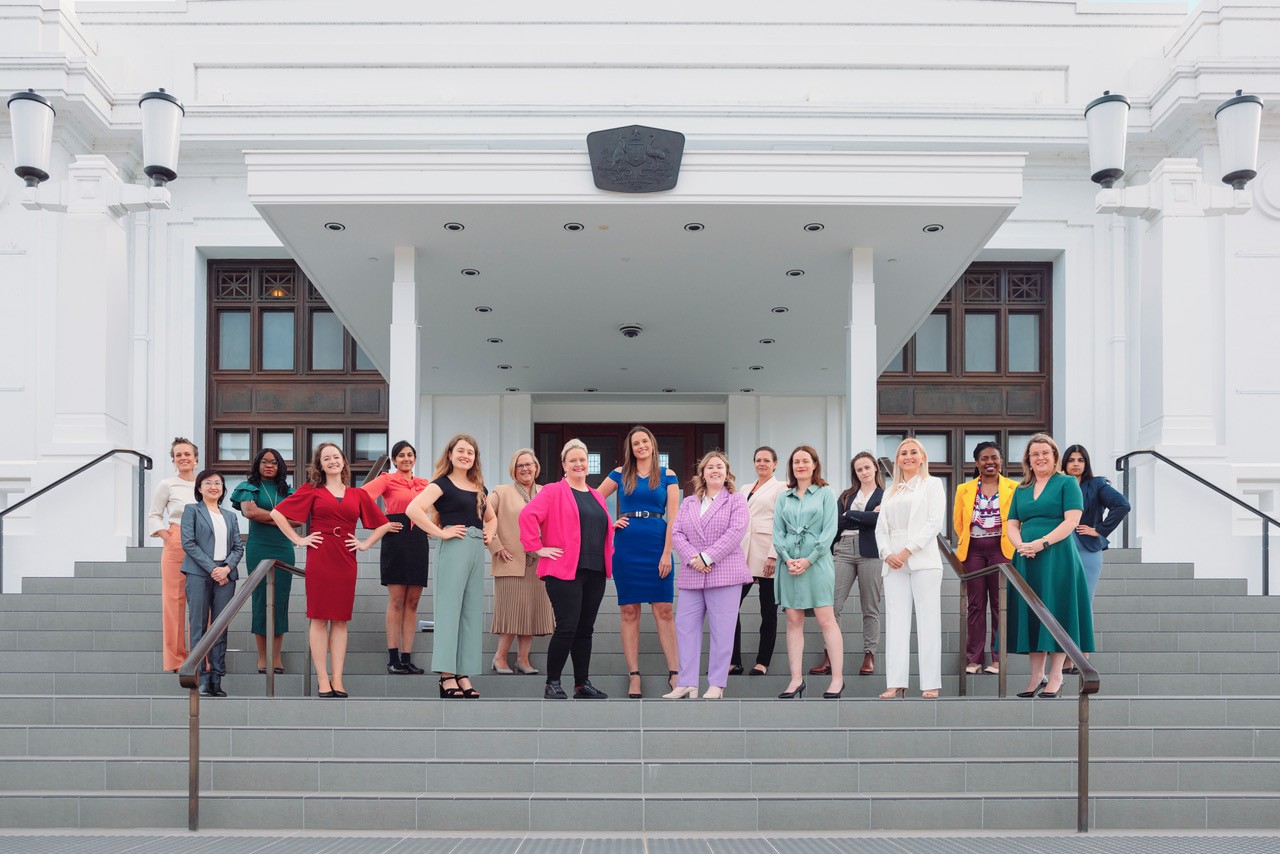UC program paving the way to greater female political representation
It’s 2023 and nineteen women find themselves standing on the steps of Old Parliament House.
They don’t share a cultural background or come from the same age bracket. They don’t even share the same political ideas.
But they all have one thing in common – they are on a pathway to political life.
They are also all graduates of the University of Canberra’s inaugural intake of the Pathways to Politics for Women program.
Pathways to Politics for Women is a non-partisan national initiative that delivers practical training to participants that help them to develop the skills and confidence to become strong political leaders.
An initiative of the Trawalla Foundation, Women’s Leadership Institute Australia and the University of Melbourne, the program was launched at the University of Melbourne in 2016 and has since expanded to every state and territory across the country.
Applications for the 2024 University of Canberra program are open to all female residents of the ACT and Southern New South Wales.
“It was more than I ever expected”
As well as being the second year the program is being run by the University of Canberra, 2024 expects to see more than 50 alums to run in state and local elections nationally.
Among their ranks is Heidi Prowse OAM who graduated from the University of Canberra’s inaugural Pathways to Politics program in 2023.
Heidi’s journey into community advocacy started when she met her late husband Andrew who lived with cystic fibrosis.
“It hadn’t really been something of interest before meeting Andy” she says.

Heidi Prowse OAM says Pathways to Politics helped her hone her skills to run for election. Picture: Supplied/UC
As Heidi came to learn more about the barriers to accessing healthcare for those living with the disease, she decided she wanted to make a change.
“I became very interested in the whole political system and how the decisions of leaders drive policy to the betterment or detriment of the people on the ground.”
Heidi says she stumbled upon the program by accident.
She says she ended up being a “seat filler” at the launch of the ACT program and walked out ready to apply.
“I had thought about it deeply and had a plan to run in the ACT 2024 Territory Election. I saw this as a great opportunity and being in the right place at the right time.”
While going into the program with hopes that it would provide her with some tips for her upcoming election campaign, she had no idea what kind of effect it would have on her life.
“It was more than I ever expected,” she said.
“The program had a wonderful combination of lived experience stories from current and former females in politics [and] an equal amount of practical skills from political media, writing speeches and even viewing policy from a gendered lens – which was fascinating.”
“It was so interesting and thought provoking, by the time it was over I wanted to start all over again!”
Heidi says one of the highlights was getting to hear multi-partisan panels of women who had experience with political life.
“Technically politics was left at the door with everyone coming to the table open and ready to share their experiences.”
Since graduating from the program, Heidi has been putting her skills to work and is the Labor Candidate for Ginninderra in the 2024 ACT Election.
“I now understand how to make a difference in the world”
In a very similar vein, accessibility to quality healthcare is something that fellow program graduate Nicole McMahon has long been passionate about.
With an extensive resume involving cancer research, HIV gene therapy and years working as a health journalist, Nicole says her experience working in the health industry inspired her to make a difference.
Nicole also cites her personal journey through the healthcare sector as a patient had a profound impact on drive to make change.

Nicole McMahon’s experience working in the healthcare sector inspired her to make change. Picture: Supplied/UC
“I have recently survived breast cancer, and through this harrowing journey of the health system alongside many others from all walks of life – and some who sadly did not survive – has highlighted to me that we need to ensure Australia’s health system survives the rising cost pressures.”
While browsing social media in 2023, Nicole stumbled upon an advertisement for Pathways to Politics for Women and saw an exciting opportunity.
“I have always wanted to change the world and make a difference, so thought I would put my hand up,” she said.
Like Heidi, Nicole was surprised at how much she came to learn through the program.
“I thought I knew a bit about politics. Turns out I was wrong,” she said.
“The program highlighted to me the unknowns. Campaigning, nailing your pitch. Knowing what you would stand for.”
This is where the program addresses a key issue that keeps untold numbers of women out of politics: lack of resources.
As Nicole says, “You could have a world changing view and the potential to be successful, but if you don’t consider all aspects of running for office…you would never be successful.”
This kind of accessibility to resources is particularly important for women, as they often face stigmas and barriers in their professional life that men doing the same job simply don’t have to deal with.
This is something that Nicole is all too familiar with.
“As a working mother I have been told I didn’t belong in the workplace,” she says.
“We still have a way to go to get to equality, diversity and inclusion [in politics].”
Discouragement remains an issue
Despite gains in female parliamentary representation in recent years, there are still significant hurdles to overcome in the quest to achieve gender parity in the political arena.
Since former Prime Minister Julia Gillard’s exit from politics, Australia hasn’t gone to a single federal election with a woman leading a major political party.
And with the exception of the Senate where women occupy just over half of all seats, the number of female faces among the ranks of successive parliaments hasn’t exactly skyrocketed.
Women are under-represented in seven of Australia’s nine parliaments, with the ACT holding position as the only jurisdiction where women make up the majority.
The picture is quite bleak in the Queensland Parliament, where women are outnumbered by men more than two to one.
It is this lack of visible female representation in the halls of power that discourage women from following their political aspirations.
According to 2022 research, only 24% of women aspiring to engage in politics could see themselves running for office.
It is this landscape that women are met with from that outset that involves them diving headfirst into a world that was not built with them in mind, which sees them cop far more criticism and judgement than their male counterparts.
This was the case for Mijica Lus, who joined the Pathways to Politics program in 2023.
“I grew up as a young girl from Papua New Guinea who viewed politics as a man’s place and not really for me,” she said.
“I had seen how my parliament reflected a majority of male leaders, while female leaders led more grassroot level movements.”
Despite these realities, Mijica recalls how her lifelong interest in politics gave her the push to pursue her dreams of community advocacy.

Growing up with a migrant background has given Mijica a unique perspective on community advocacy. Picture: Supplied/UC
“I grew up a very curious girl, always wondering why things were the way they were and hearing about the decisions my local MPs made, which of course made me wonder how it got to that point,” she said.
Undeterred by what she saw as a male-dominated sphere, the 2022 Young Canberra Citizen of the year has carved out her mark as a strong community advocate for multicultural communities in Canberra, particularly those from a refugee background.
“I am determined to make and see a change in my generation and future generations for women to be encouraged to run for elections” she says.
She was motivated to apply for the program to learn more about the political system in which she was advocating for change.
The program connected her with other aspiring female leaders who continue to encourage her on her own political journey.
“I can confidently say I have gained strength in my wings to one day venture into politics to represent my family, the ACT, Australia and the Pacific Islands.”
Applications for the Pathways to Politics for Women program are now open in every state and territory. Applications close on 24 April 2024. Prospective applicants can find out more and apply online at pathwaystopolitics.org.au.
- Picture at top: 2023 UC Pathways to Politics graduates on the steps of Old Parliament House, Canberra. Picture: Supplied/UC
Sarah Grieb is studying a Bachelor of Communication and Media (Journalism)/Bachelor of Politics and International Relations at the University of Canberra. She is currently interning at BroadAgenda and works at ABC Canberra as a radio producer and Network Operations Assistant.





